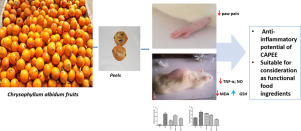当前位置:
X-MOL 学术
›
Nutr. Res.
›
论文详情
Our official English website, www.x-mol.net, welcomes your
feedback! (Note: you will need to create a separate account there.)
Chrysophyllum albidum fruit peel attenuates nociceptive pain and inflammatory response in rodents by inhibition of pro-inflammatory cytokines and COX-2 expression through suppression of NF-κB activation
Nutrition Research ( IF 3.4 ) Pub Date : 2020-05-01 , DOI: 10.1016/j.nutres.2020.03.004 Abayomi M Ajayi 1 , Victoria B Badaki 1 , Oluwakemi O Ariyo 1 , Benneth Ben-Azu 2 , Folake O Asejeje 3 , Aduragbenro D A Adedapo 1
Nutrition Research ( IF 3.4 ) Pub Date : 2020-05-01 , DOI: 10.1016/j.nutres.2020.03.004 Abayomi M Ajayi 1 , Victoria B Badaki 1 , Oluwakemi O Ariyo 1 , Benneth Ben-Azu 2 , Folake O Asejeje 3 , Aduragbenro D A Adedapo 1
Affiliation

|
Chrysophyllum abidum fruit is a seasonal fruit commonly eaten as snacks with abundant health promoting phytochemicals in the fruit peels. The fruit peels have been reported to be rich in anti-inflammatory eleagnine, myricetin rhamnoside, quercetin, linoleic acid and oleic acid. We hypothesized that the anti-inflammatory effect of the peel extract involve suppression of pro-inflammatory cytokines, cyclooxygenase-2 and nuclear factor-kappa B (NF-κB). Hence, this study was designed to assess the anti-nociceptive and anti-inflammatory effects of fruit peel extract of Chrysophyllum albidum in animal models of nociception and inflammation. The anti-nociceptive activity of CAPEE (100 and 400 mg/kg) was evaluated in acetic acid-induced writhing and formalin-induced paw licking in mice. Formalin-induced paw edema and carrageenan-induced air pouch models of inflammation were used to evaluate the anti-inflammatory activity. CAPEE (100 and 400 mg/kg) significantly reduced abdominal writhing and paw licking in acetic acid and formalin tests in mice, respectively. CAPEE demonstrated significant inhibition of paw edema at 24 h (41.0% and 55.7%) and 72 h (52.3% and 86.6%) after formalin injection. CAPEE suppressed inflammatory responses in carrageenan-induced air pouch by reducing exudates, inflammatory cells infiltration, nitrites and myeloperoxidase activity. There was significant inhibition of tumor necrosis factor-alpha, interleukin-6 levels and reduced immunopositive expression of COX-2 and NF-κB. In conclusion, CAPEE has anti-nociceptive and anti-inflammatory potentials via mechanisms associated with inhibition of pro-inflammatory cytokines and cyclooxygenase-2 (COX-2) expression through suppression of nuclear factor kappa B (NF-κB) activation, and has potential as a functional food ingredient.
中文翻译:

Chrysophyllum albidum果皮通过抑制NF-κB活化抑制促炎细胞因子和COX-2表达来减轻啮齿动物的伤害性疼痛和炎症反应
Chrysophyllum abidum 水果是一种时令水果,通常作为零食食用,果皮中含有丰富的促进健康的植物化学物质。据报道,果皮含有丰富的抗炎 eleagnine、杨梅素、鼠李糖苷、槲皮素、亚油酸和油酸。我们假设果皮提取物的抗炎作用涉及抑制促炎细胞因子、环氧合酶-2 和核因子-κB (NF-κB)。因此,本研究旨在评估 Chrysophyllum albidum 果皮提取物在伤害感受和炎症的动物模型中的抗伤害和抗炎作用。CAPEE (100 和 400 mg/kg) 的抗伤害性活性在小鼠的乙酸诱导的扭体和福尔马林诱导的舔爪中进行评估。福尔马林诱导的爪水肿和角叉菜胶诱导的气袋炎症模型用于评估抗炎活性。CAPEE(100 和 400 mg/kg)分别显着减少了小鼠在醋酸和福尔马林试验中的腹部扭动和舔爪。CAPEE 在福尔马林注射后 24 小时(41.0% 和 55.7%)和 72 小时(52.3% 和 86.6%)显示出对爪水肿的显着抑制。CAPEE 通过减少渗出物、炎症细胞浸润、亚硝酸盐和髓过氧化物酶活性来抑制角叉菜胶诱导的气囊中的炎症反应。显着抑制肿瘤坏死因子-α、白细胞介素-6 水平,降低 COX-2 和 NF-κB 的免疫阳性表达。综上所述,
更新日期:2020-05-01
中文翻译:

Chrysophyllum albidum果皮通过抑制NF-κB活化抑制促炎细胞因子和COX-2表达来减轻啮齿动物的伤害性疼痛和炎症反应
Chrysophyllum abidum 水果是一种时令水果,通常作为零食食用,果皮中含有丰富的促进健康的植物化学物质。据报道,果皮含有丰富的抗炎 eleagnine、杨梅素、鼠李糖苷、槲皮素、亚油酸和油酸。我们假设果皮提取物的抗炎作用涉及抑制促炎细胞因子、环氧合酶-2 和核因子-κB (NF-κB)。因此,本研究旨在评估 Chrysophyllum albidum 果皮提取物在伤害感受和炎症的动物模型中的抗伤害和抗炎作用。CAPEE (100 和 400 mg/kg) 的抗伤害性活性在小鼠的乙酸诱导的扭体和福尔马林诱导的舔爪中进行评估。福尔马林诱导的爪水肿和角叉菜胶诱导的气袋炎症模型用于评估抗炎活性。CAPEE(100 和 400 mg/kg)分别显着减少了小鼠在醋酸和福尔马林试验中的腹部扭动和舔爪。CAPEE 在福尔马林注射后 24 小时(41.0% 和 55.7%)和 72 小时(52.3% 和 86.6%)显示出对爪水肿的显着抑制。CAPEE 通过减少渗出物、炎症细胞浸润、亚硝酸盐和髓过氧化物酶活性来抑制角叉菜胶诱导的气囊中的炎症反应。显着抑制肿瘤坏死因子-α、白细胞介素-6 水平,降低 COX-2 和 NF-κB 的免疫阳性表达。综上所述,










































 京公网安备 11010802027423号
京公网安备 11010802027423号